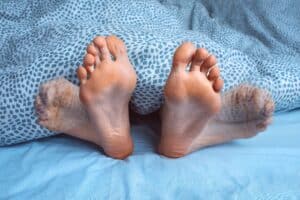
What Causes Restless Leg Syndrome?
The causes of RLS are still not quite known. A dopamine imbalance could be a possible cause since it controls muscle movement. However, around 22% of people with RLS have venous insufficiency, making it a potential cause as well.
RLS may also be hereditary, especially if it develops before age 40. Furthermore, pregnancy and hormonal changes can worsen RLS if you already have the condition.
Symptoms of RLS
As we briefly mentioned, RLS can cause an irresistible need to move the legs; however, it can also cause:
- Discomfort in the legs when they’re not moving
- Relief from symptoms while moving the legs
- Symptoms occur mainly at night
- Leg twitching while sleeping
- Uncomfortable sensations such as crawling, pulling, throbbing, itching, and aching in the legs
RLS differs from common cramps or aches in the leg muscles; it is most often recognized due to the constant need to move the legs.
Does RLS Require Treatment?
RLS does not require treatment, especially if symptoms are mild. Often, a few lifestyle changes may be required for a patient to see improvement in their RLS symptoms. However, if symptoms are severe, medication may be needed. These medications may increase dopamine levels in the brain, thereby improving RLS. Other options may include muscle relaxants, opioids, and medications affecting calcium channels.
If the cause of your RLS is known, such as an iron deficiency or venous insufficiency, treatment of this condition will usually cause RLS to go away on its own.
Discuss RLS Treatment With Dr. Kevin P. Kern
If you’re experiencing symptoms of RLS, discuss your concerns with Dr. Kern right away. He can help you determine if there is an underlying cause and if treatment is necessary. He can also provide you with lifestyle change recommendations to improve your symptoms.
Contact Vein Specialists of Geneva, Ltd., at 630-425-0800 to schedule an appointment today.

